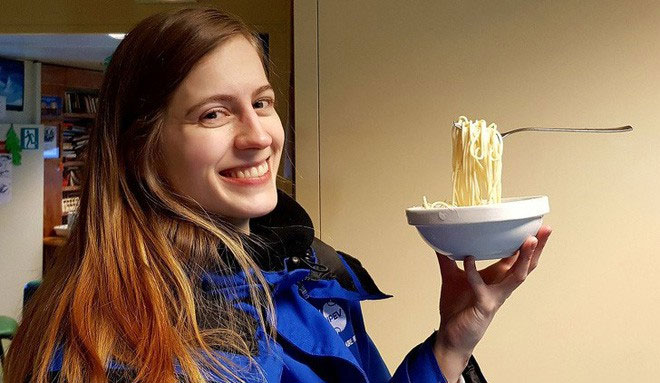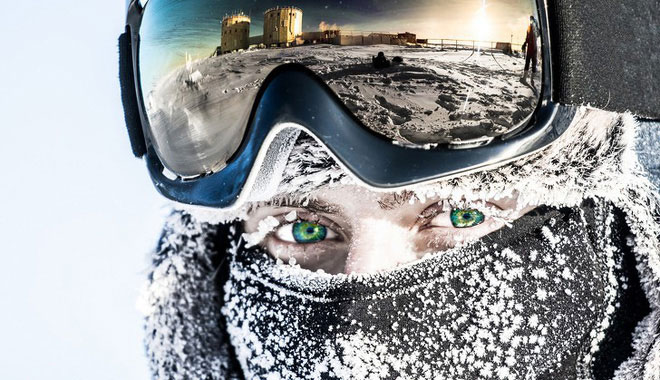Life in Antarctica: bacteria also
If you feel a bit lazy when you have to go to school and work at the beginning of the week, think again. At the very least, you don't have to greet the new day in Antarctica!
Antarctica is also known as the White Mars because its living conditions are too harsh. However, besides native species that are "pointed" by nature for living here, people also want to conquer this land.
For example, there is a research facility that has been operating steadily since 2005 - Concordia solar station founded by France and Italy. At this time, an estimated 60 people are working at Concordia. Let's see how they lived, at least 6 extremely special things that only found in Antarctica!
1. Cold to bacteria also trembles

Noodles that have not been eaten before are stopped because they are too cold.
The average temperature of Antarctica is -50 degrees Celsius, the lowest is -80 degrees Celsius. Such conditions make many species of bacteria also unable to survive.
And the scientists, engineers in Antarctica, they have to wear many layers of clothing, wear specialized shoes, wear gloves and glasses. The weight of the suit is as heavy as the astronaut's, proving the name "White Mars" for Antarctica is not wrong!
2. Around white and odorless

In Antarctica, almost everyone can't smell anything.
Similar to the desert across the 4 sides of sand, in Antarctica all sides are white, making the determination of direction very difficult. The story goes round and round the way out, or has to set up a tent to shelter when there is a snowstorm for a long time.
Moreover, Concordia research station and many other points in Antarctica are located at an altitude of 3,000m above the sea level, so there is thin air and low oxygen. Almost everyone can't smell anything.
So, on the flight back to their homeland, many scientists were moved because for a long time they could smell the familiar scents!
3. In Antarctica, sometimes do not know the day or night

Here, human biological pace is completely reversed.
In the winter, the sun never goes high, making everything sink in darkness for 4 consecutive months. In the summer, the sun never sets.
Therefore, the human biological pace is completely reversed."Eating well, not sleeping well" often happens.
However, there is a joy called the first sunshine! After 4 months of winter, everyone will stop everything, just to climb up to the roof of the house and watch the sun for the first time "re-export" after a period of sleep.
4. Supermarkets 4,000 kilometers away

Everything at the research station must be stocked, including fish eggs and milk and vegetables.
It's the closest supermarket from Concordia Research Station. So everything at the research station must be stocked, including fish eggs and milk and vegetables. Frozen foods, eggs are wrapped in wax.
And you know what happens when one of the items is exhausted? Alexey Akaikin, a glacier researcher from Russia, once said: "Today everyone received word that Concordia has completely cleared of fresh milk! So it was necessary to use formula until it was resupply."
5. Prohibit urination while taking a bath

In Antarctica, people try not to urinate during a bath, so that the water will be cleaned and reused later.
Clean water in Corcodia is made of snow, and takes a lot of fuel to melt snow. So people here are always conscious of saving water. They try not to urinate during the shower, so that the water will be cleaned and reused later.
If the treatment system detects elevated ammonia levels, maintenance staff will report this during the general meeting.
6. After all, people not only work but share life together
Because the professional work in Corcodia is quite diverse, when people are free, people also introduce and share with each other. They can take you to visit your lab, or play basketball on the ice, or dance and mingle with the sleeping party!
On weekends, professors and scientists call their friends, family, relatives and students via Skype. At that time, all languages such as German, French, Italian, English and Russian will appear. And since the residents of Corcodia are from such a lot of countries, they also cook every dish!

Scientists live and work in Southern Vietnam.(Photo: A.Razeto)
An Antarctic professor - Professor Jenny Baeseman said: "We are excited and lucky to be here. The Antarctic research station is like a distant mine. It is not. Whose house is the eternal house, so it is the home of everyone. "
Although with many different expertise, all people working in Antarctica are determined to serve scientific research. They love their work and life, despite harsh natural conditions. Is it interesting and worth learning?
- Exploring the South Pole
- Exotic creatures in Antarctica: Science must rethink the search for extraterrestrial life
- Discovering life under thick ice in Antarctica
- Bacteria multiply 800m below the surface of Antarctic ice
- China decided to find extraterrestrial life
- Normal jobs become extremely difficult in Antarctica
- Discovered a completely new life form
- The first sign of life on Earth could be bacteria
- 100 million year old fossil forest
- Bacteria more than three billion years old hide in the cave
- Detection of bacteria that can regulate climate
- The most toxic and strange forms of bacteria on the planet
 'Fine laughs' - Scary and painful torture in ancient times
'Fine laughs' - Scary and painful torture in ancient times The sequence of numbers 142857 of the Egyptian pyramids is known as the strangest number in the world - Why?
The sequence of numbers 142857 of the Egyptian pyramids is known as the strangest number in the world - Why? Miracle behind the world's largest stone Buddha statue
Miracle behind the world's largest stone Buddha statue What is alum?
What is alum?